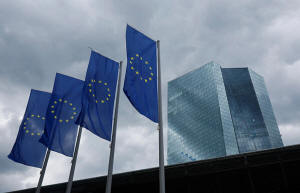ECB policymakers warn about inflation challenge
 Send a link to a friend
Send a link to a friend
 [June 07, 2024] By
Balazs Koranyi [June 07, 2024] By
Balazs Koranyi
FRANKFURT (Reuters) - European Central Bank policymakers warned on
Friday that the final stage of pushing inflation down to 2% could be
especially hard but said they were confident that policy was working as
intended, while some even saw room to ease policy further in 2024.
The ECB cut interest rates from record highs on Thursday in a
long-telegraphed move, but held back from any pledge to ease policy
further after inflation and wage growth data in recent weeks came in
above its expectations, indicating it will need even longer to meet its
target.
The biggest warning came perhaps from Germany, the euro zone's largest
economy, which poured cold water on suggestions that a big wage jump
this year was a one-off.
"Negotiated wages are expected to rise particularly sharply this year
and continue to see strong growth thereafter," the Bundesbank said.
"Inflation is proving to be stubborn, especially in the case of
services."
Wage rises increase disposable incomes and thus put upward pressure on
prices, particularly in wage sensitive sectors like services.
Bundesbank chief Joachim Nagel said Thursday's rate cut was not
premature given the progress on inflation but he also said the ECB would
not be on auto pilot for further rate cuts.
Austria’s Robert Holzmann, the only policymaker to oppose Thursday’s
cut, said that inflation was stickier than the ECB predicted, so the
bank needed to act more cautiously in the future.
TRICKY FEW MONTHS
ECB Vice President Luis de Guindos said that inflation could still rise
from current levels before dropping back to 2% towards the end of next
year, making the next few months difficult.
"There will be months when inflation may even accelerate slightly but we
are convinced that next year it will converge with the target," he told
Spanish radio station Onda Cero.
"The coming months will not be easy," he said.

[to top of second column] |

Dark clouds are seen over the building of the European Central Bank
(ECB) before the ECB's monetary policy meeting in Frankfurt,
Germany, June 6, 2024. REUTERS/Wolfgang Rattay/file photo

While most policymakers refrained from making policy predictions,
Lithuania's Gediminas Simkus suggested there could be room to ease
further this year.
When asked if further monetary easing this year was possible, Simkus
said: "If the economy develops according to forecast, I think so,
yes".
Markets see between one and two cuts this year and a total of four
cuts between now and the end of next year in the 3.75% deposit rate.
Economists argue that any rate at or above 3% restricts economic
growth so ECB policy will continue to hold back the economy well
into next year.
The closest ECB President Christine Lagarde came to predicting
future moves on Thursday was when she said there was a "strong
likelihood" that Thursday's cut was not a one-off but rather the
start of a dialling back process.
Policymakers speaking to Reuters on Thursday, however, said that any
step in July is highly unlikely and the next possible window to cut
rates would be in September, provided data in the run up to that
meeting supported such a move.
ECB board member Isabel Schnabel, who has already called for a pause
in July, nuanced her words on Friday, steering clear of any specific
comment on the next meeting.
"As the future inflation outlook remains uncertain, we cannot
pre-commit to a particular rate path," she said.
(Additional reporting by Andrius Sytas; Editing by Christina
Fincher)
[© 2024 Thomson Reuters. All rights
reserved.]
This material may not be published,
broadcast, rewritten or redistributed.
Thompson Reuters is solely responsible for this content. |